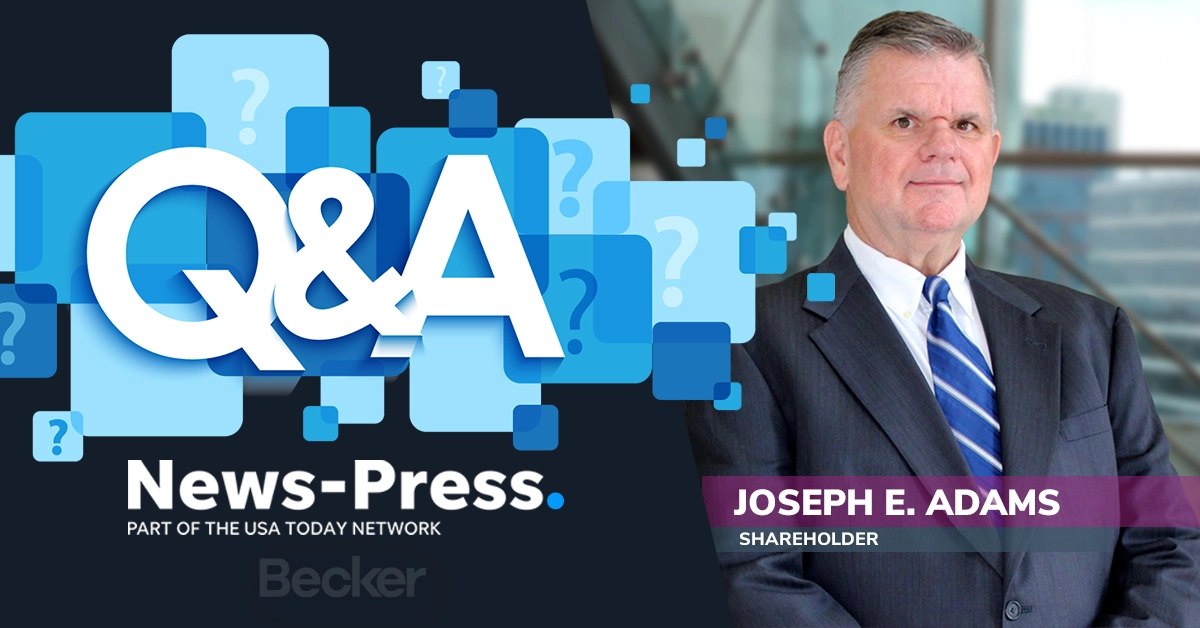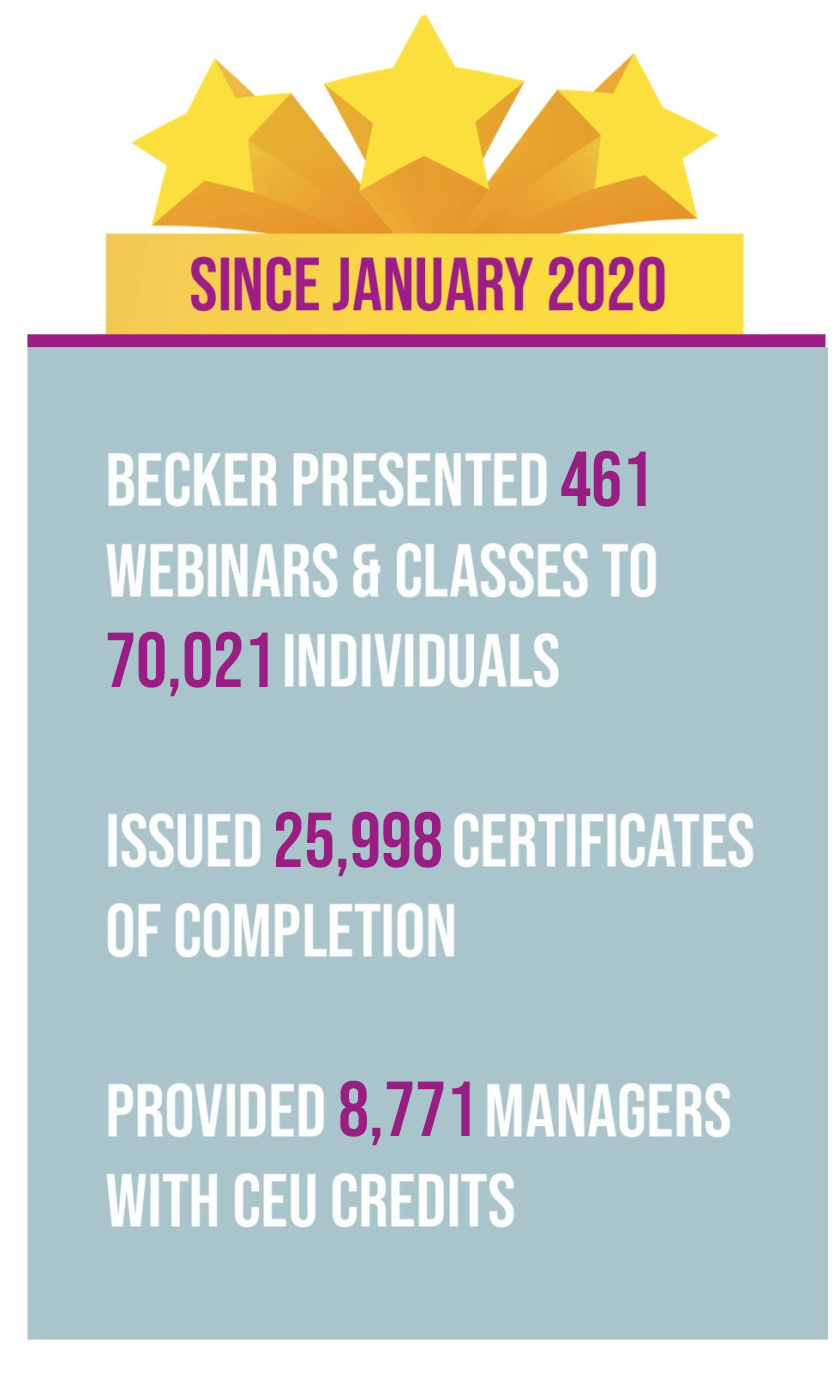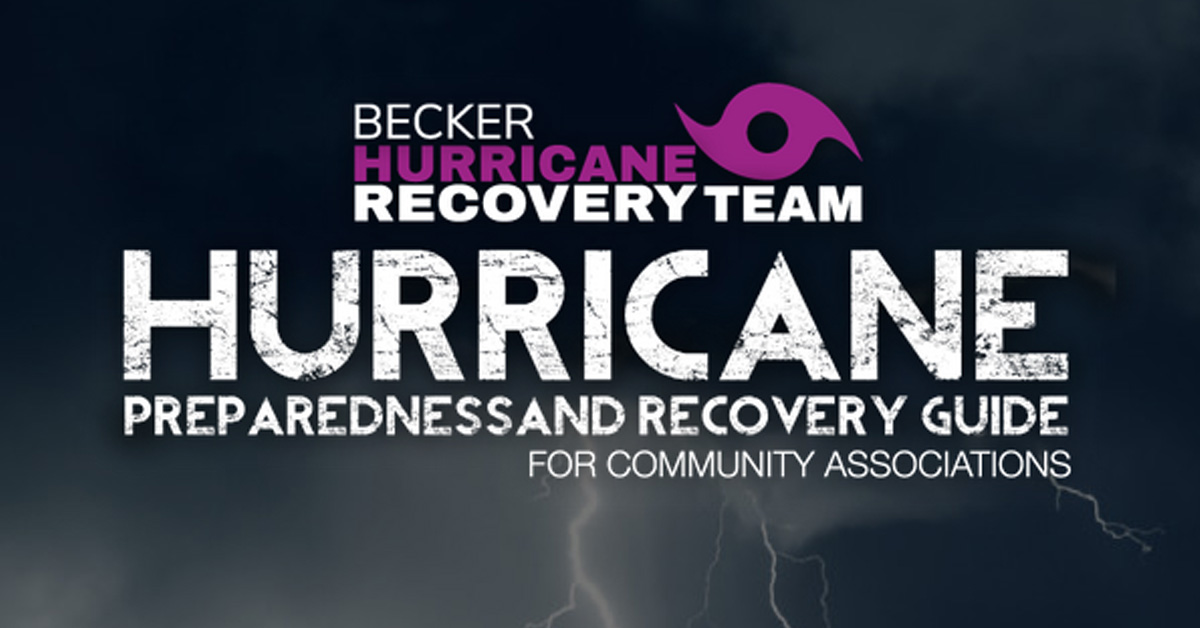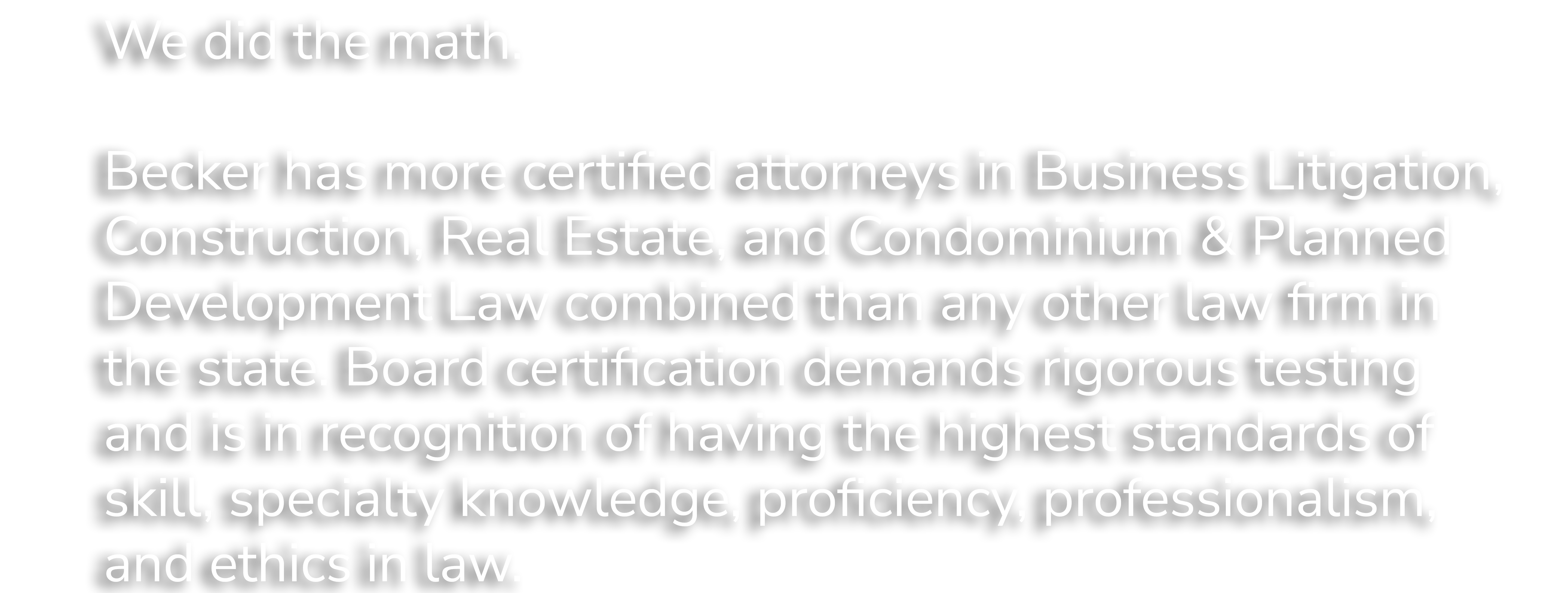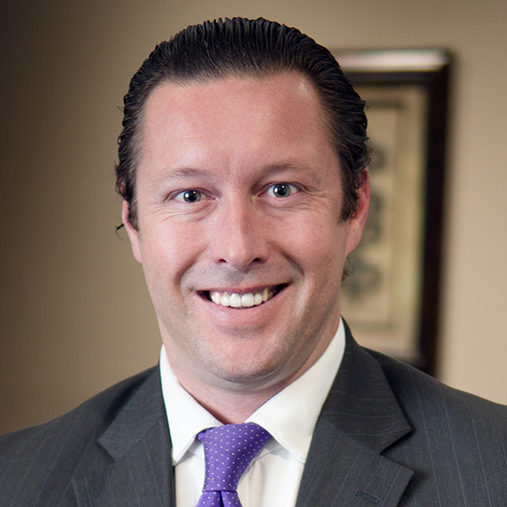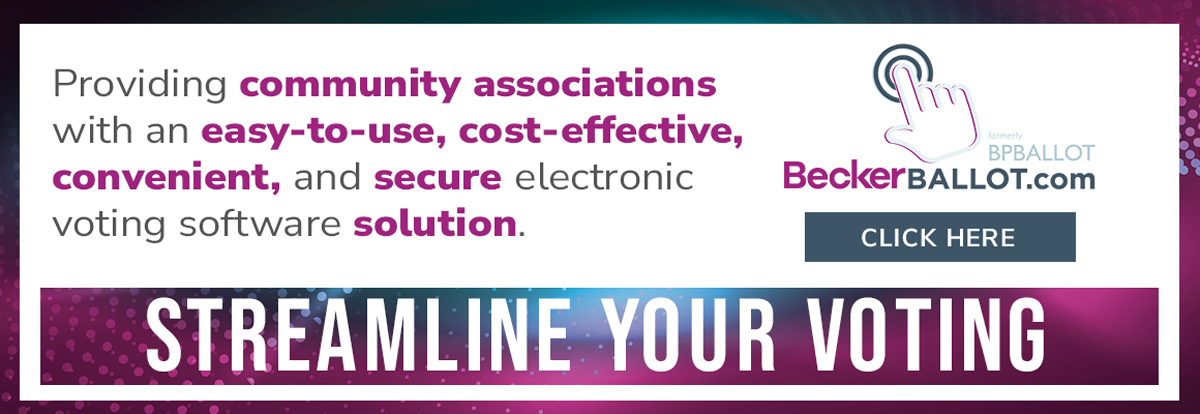Hurricane season is here. It’s time to get ready, and then stay ready. This issue of CUP also addresses the do’s and don’ts of association committees, estoppel certificates, and association contracts. Don’t miss our featured article on the Corporate Transparency Act (CTA) and beware of the recently issued scam alert.
Two of the bills signed into law this month by the Governor modify Florida Statute 720.3035 regulating architectural review. How will these two pending laws impact your community? Bryony G. Swift explains why homeowner’s associations should review their architectural review with their community association attorney in this timely article, “Homeowner Association Architectural Review Standards.”
The increase in costs, especially insurance premiums, have been difficult for condominium associations in the past couple of years. How can your community association handle these increased fees? Elizabeth A. Lanham- Patrie has all the answers in, “Does a Condominium Have a 115% Cap on Increasing Assessments?”
Over the past few years, Airbnb and VRBO have become a very popular form of short-term rental. Do owners have the right to rent their home as a vacation rental? Florence King explains the long-standing concept in Florida Law that community associations have the right to restrict perceived disruptive uses, including short term rentals within their community in “Vacation Rentals and Community Associations.”
Neglecting to actually levy the assessments that your association is trying to collect can be a fatal flaw in your association’s foreclosure case. Joseph Arena emphasizes this important lesson and why associations need to be familiar with their governing documents in, “THIS CASE: Desch v. South Fork of Hillsborough County II Homeowner’s Association, Inc.”
Articles
Homeowner Association Architectural Review Standards
By: Bryony G. Swift
Two of the bills signed into law this month by the Governor modify Florida Statute 720.3035 regulating architectural review. Because of these two pending changes to the law, homeowner’s associations should review their architectural review with their community association attorney.
Does a Condominium Have a 115% Cap on Increasing Assessments?
By: Elizabeth A. Lanham-Patrie
The increase in costs, especially insurance premiums, have been difficult for condominium associations in the past couple of years. I have been asked on many occasions if there is a cap on increasing the budget by more than 115% from the previous year.
Vacation Rentals and Community Associations
By: Florence King
Over the past few years, Airbnb and VRBO (collectively referred to as “Vacation Rentals”) have become a very popular form of short-term rental. Vacation Rentals include a range of rentals from houses, condos, or in some instances rooms for a period under 30 days’ at a time. While some owners believe they have this right under the concept, “I own it and can use it as I wish,” there has been a long-standing concept in Florida Law that community associations have the right to restrict perceived disruptive uses, including short term rentals within their community.
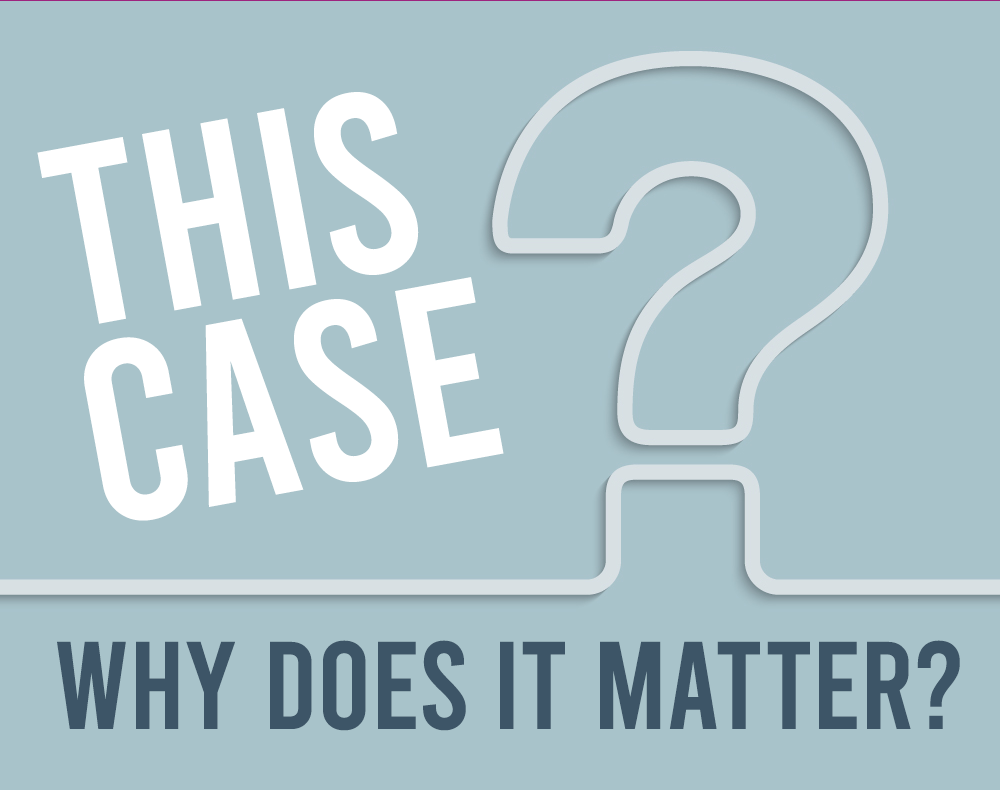
Desch v. South Fork of Hillsborough County II Homeowner’s Association, Inc.
364 So. 3d 1064 (Fla. 2d DCA 2023)
By: Joseph Arena
Neglecting to actually levy the assessments that your association is trying to collect can be a fatal flaw in your association’s foreclosure case. That is the lesson of THIS CASE.
At the heart of the dispute in THIS CASE are legal costs incurred by the association defending its interests in a mortgage foreclosure brought against a homeowner. As was the association’s practice, those costs were placed onto the homeowner’s account ledger and became the basis for the association to start collections and ultimately to pursue its own foreclosure of the homeowner’s property for her failure to pay. While the association did a good job persuading the court that its Declaration of Covenants contains an “individual assessment” provision that allows these costs to be assessed against the homeowner, it was unable to persuade the court that an individual assessment was actually levied by the board of directors. The court found that the association’s practice of automatically placing legal costs onto an owner’s account ledger was not a substitute for a vote by the board of directors to levy the assessment. The court commented that the association was unable to produce evidence “that the Board of Directors made any decision concerning the individual assessment against [the homeowner].” That caused the court to rule in the homeowner’s favor and against the association.
Ordinarily, by holding meetings to adopt budgets and special assessments, associations shield themselves from the kinds of defensive arguments that prevailed in THIS CASE. However, as THIS CASE points out, where individual or special assessments against a single owner are concerned, it is important for associations to be familiar with their governing documents. Unless there is a specific provision stating that an individual or special assessment against a single owner is imposed automatically, the association will probably need action by the board of directors to levy the assessment. Furthermore, not all costs incurred by an association on account of an owner may be passed on to that owner, and it is a good idea for an association to get legal advice before pursuing an owner for the reimbursement of costs.
QUESTION OF THE MONTH
Q: I recently requested an estoppel certificate from our homeowners’ association to confirm the dues and fees associated with my property in connection with my selling the home. When I received the bill, the amount charged was higher than the cap mentioned in the Florida Homeowners’ Association Act. Can they legally charge more than what is stipulated by Florida law?
GOVERNMENT ISSUES SCAM ALERT FOR CORPORATE TRANSPARENCY ACT
The U.S. Department of Treasury’s Financial Crimes Enforcement Network, also known as FinCEN, recently issued an alert warning individuals and businesses that scammers are using the Corporate Transparency Act to fraudulently solicit information from individuals and businesses who may be subject to reporting requirements under the Corporate Transparency Act.
Click here to learn more on what these fraudulent scams may include.
UNDERSTANDING THE CORPORATE TRANSPARENCY ACT (CTA) AND ITS POSSIBLE IMPACT ON COMMUNITY ASSOCIATIONS
Daily Business Review
By: Donna DiMaggio Berger
Becker Shareholder Donna DiMaggio Berger was recently featured in the Daily Business Review. Her commentary article looks at the implications the Corporate Transparency Act has on Community Associations, specifically the potential challenges for volunteer association board members in private residential communities.
Donna writes, “The CTA aims to remove the anonymity surrounding shell companies and similar entities, providing clarity on actual ownership but in the community association context should the CTA really apply?”
CALLING ALL BOARD MEMBERS AND COMMUNITY MANAGERS
As leaders in Community Association Law, we not only helped write the law – we also teach it.
Did you know Becker provides over 200 educational classes per year throughout the State of Florida on a variety of topics ranging from board member certification to compliance, and everything in between? Our most popular classes are now available online!
To view our entire class roster, visit: beckerlawyers.com/classes
UPCOMING CLASS OFFERING:
- Condo Terminations: Unthinkable No Longer
06/04/24 – 10:00AM ET – Register Now - Knowledge is Power
06/11/24 – 10:00AM ET – Registration coming soon - Knowledge is Power
06/25/24 – 11:00AM ET – Registration coming soon
Featured Testimonial
“Over the years I have attended many Becker classes both in person and zoom, and thanks to them I have learned and come to understand so much about being on a Board, the problems that come up and how to deal with them, and for that I am so grateful. The Becker Classes have taught me the proper and legal way to deal with issues that every community goes through at one time or another. So, I would just like to say, Thank you!”
~ Patricia Clarke
Can They Do That?
Becker’s “Can They Do That” video series tackles some of the unique problems that homeowners and renters face today. We answer your questions, no matter how far-fetched they may seem. From service animals to nudists in your community, we get to the bottom of it and let you know – “Can They Do That?”
Becker Steps Up to the Mic with Podcast,
‘Take It To The Board with Donna DiMaggio Berger’
Think you know what community association life is all about? Think again. Residents must obey the rules, directors must follow the law, and managers must keep it all running smoothly. Take It To the Board explores the reality of life in a condominium, cooperative or homeowners’ association, what’s really involved in serving on its board, and how to maintain that ever-so-delicate balance of being legally compliant and community spirited. Leading community association attorney Donna DiMaggio Berger acknowledges the balancing act without losing her sense of humor as she talks with a variety of association leaders, experts, and vendors about the challenges and benefits of the community association lifestyle. Don’t have a streaming app? You can now find all episodes on YouTube! Click here to listen now.
RECENT EPISODES:
-
- Navigating Defamation Lawsuits and Non-Compete Clauses with Keith Grumer, of Grumer Law
- Not In My Backyard! Regulating Short-Term Vacation Rentals with Texas Attorney David Schwarte
- Understanding How to Handle your Association’s Insurance Claim with Public Insurance Adjuster Ken Shriberg
- Everything You Need to Know About Concrete Restoration Projects with Alessandra Bianchini, of Carousel Development and Restoration Inc.
- Crafting and Protecting Your Community’s Trademark with Becker’s Valeria Angelucci
- Cooking Up Community Connection with Tim and Lara Boyd of Mustard Seed Bistro
- The Benefits of “Umbrella Organizations” with Brickell Homeowners Association’s President, Ernesto Cuesta
- The Do’s and Don’ts of Association Committees with Becker’s Ken Direktor
Featured Episode: The Do’s and Don’ts of Association Committees with Becker’s Ken Direktor
Does your association have committees? Do you find them to be a helpful addition to association operations or a harmful “shadow board” with the potential to create liability for the association, its directors, and members? Host Donna DiMaggio Berger sits down with Ken Direktor, Chair of Becker’s Community Association practice, to peel back the curtain on the inner workings of committees: the good, the bad and the ugly. The following committees are discussed in this episode: Fining/Grievance; Architectural Control; Landscaping; Social/Entertainment; Document Rewrites; Budget; Neighborhood Watches and more. Find out which of these committees are vital to your community and which may be more problematic than they’re worth.
ASSOCIATION CONTRACTS
FCAP Managers Report
By: Nicolas M. Jimenez
Whether your community association is a condominium, cooperative, or a homeowners’ association, Florida law empowers your association to enter into contracts in connection with the maintenance and operation of the community. Often times, your association is all but required to contract with third parties in order to maintain and operate the community, as it does not have the in house employees required for specialized, but essential tasks, such as the maintenance and repair of your community’s plumbing, elevators, or fire alarms. However, as explained in this article, your association should always consult its legal counsel before entering into any contract, as association contracts are not only the subject of varying legal requirements, but they also may burden your association with long lasting terms and conditions that may be very costly and difficult to renegotiate once a contract is signed.
Becker Shareholder Mary R. Hawk Appointed Chairperson of 12th Judicial Circuit Local Professionalism Panel
Becker is delighted to announce that Shareholder Mary R. Hawk has been appointed as the Chairperson of the 12th Judicial Circuit Local Professionalism Panel. Established by the Florida Supreme Court in 2013, the Local Professional Panels operate within each judicial circuit to review complaints of unprofessional conduct within the legal profession.
Before her appointment as Chairperson, Ms. Hawk served on the 12th Judicial Circuit Local Professionalism Panel for several years. Each Local Professionalism Panel is comprised of 14 local attorneys, appointed by the chief judge of the circuit, and is responsible for determining whether the attorney would benefit from corrective measures or various programs offered by the Florida Bar.
DID YOU KNOW?
June 1 Marks the Start of Hurricane Season
Community Association boards and managers should ensure that their communities have adequate disaster planning measures in place as hurricane season approaches. To help you in weathering the storm, check out Becker’s Hurricane Guide which provides important tips and information to help protect your community.




